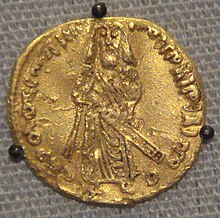Abdul Malik ibn Marwan
| Abd al-Malik ibn Marwan عبد الملك بن مروان |
|||||
|---|---|---|---|---|---|

Possibly Abd al-Malik depicted on a coin
|
|||||
| Caliph of the Umayyad Caliphate | |||||
| Reign | 12 April 685 – 8 October 705 | ||||
| Predecessor | Marwan ibn al-Hakam | ||||
| Successor | Al-Walid ibn Abd al-Malik | ||||
| Born | 646 Medina, Arabia |
||||
| Died | 8 October 705 (aged 59) | ||||
| Wives |
|
||||
| Issue |
Al-Walid I Hisham Abdallah Sulayman Maslamah Yazid II Fatima |
||||
|
|||||
| Dynasty | Umayyad | ||||
| Father | Marwan I | ||||
| Mother | Aisha bint Mwauyia ibn Al-Mughira | ||||
| Full name | |
|---|---|
| Abd al-Malik ibn Marwan |
Abd al-Malik ibn Marwan (Arabic: عبد الملك بن مروان ‘Abd al-Malik ibn Marwān, 646 – 8 October 705) was the 5th Umayyad caliph. He was born in Medina, Hejaz, Abd al-Malik was a well-educated man and capable ruler who was able to solve many political problems that impeded his rule. The 14th-century Muslim historian Ibn Khaldun stated that "`Abd al-Malik ibn Marwan is one of the greatest Arab and Muslim Caliphs. He followed in the footsteps of `Umar ibn al-Khattab, the Commander of the Believers, in regulating state affairs".
During his reign, all important records were translated into Arabic, and for the first time, a special currency for the Muslim world was minted, which led to war with the Byzantine Empire under Justinian II. The Byzantines were led by Leontios at the Battle of Sebastopolis in 692 in Asia Minor and were decisively defeated by al-Malik after the defection of a large contingent of Slavs. The Islamic currency was then made the only currency of exchange in the Muslim world. Also, many reforms happened in his time relating to agriculture and commerce. Al-Malik extended and consolidated Muslim rule, made Arabic the state language and organised a regular postal service.
Abd al-Malik spent most of his early life in Medina with his father. There, he developed useful relationships with the religious circles of the city. He studied Islamic jurisprudence under Umm Darda as Sughra in Damascus. At 16, he was given limited responsibilities by Muawiya II. In 683, he and his father were driven out of Medina by local rebels. On the way to Damascus, he crossed paths with the Syrian army, entailed with the task of ending the rebellion.
...
Wikipedia
